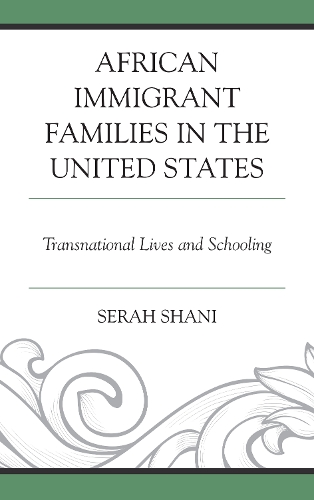
African Immigrant Families in the United States: Transnational Lives and Schooling
(Hardback)
Publishing Details
African Immigrant Families in the United States: Transnational Lives and Schooling
By (Author) Serah Shani
Bloomsbury Publishing PLC
Lexington Books
26th November 2018
United States
Classifications
Professional and Scholarly
Non Fiction
Anthropology
305.896073
Physical Properties
Hardback
186
Width 160mm, Height 231mm, Spine 16mm
386g
Description
Sub-Saharan African immigrants are emerging as the new model minority in the United States, excelling in education and social mobility. In African Immigrant Families in the United States: Transnational Lives and Schooling, Serah Shani examines the socioeconomic and cultural mechanisms behind their high levels of success. Shani explores the dynamics of Ghanaian transnational immigrants lives and portrays a complex relationship between class, context, beliefs, and cultural practices. This book is recommended for scholars of anthropology, sociology, education, and African studies.
Reviews
African Immigrant Families in the United States highlights the important role of ethnic community organizations, particularly religious institutions, in the academic success of children of both elite and non-elite immigrants. -- Cati Coe, Rutgers University
African Immigrant Families in the United States considers how elite and non-elite Ghanaian-born parents engage in the education of their children, in school and beyond, in New York City. This beautifully written book elucidates the educational trajectories of immigrant children as they confront rigid American systems of race and class, and it documents how parents rely on the network village, a transnational network of fellow Ghanaians in New York and Ghana, to provide academic and other types of support and resources for their children. This superb ethnography will appeal to readers interested in immigration and education, anthropology of education, and African diaspora cultural studies. -- Lesley Bartlett, University of Wisconsin-Madison, USA
African Immigrant Families in the United States is a sensitive and nuanced contribution to our understanding of the paths migrants from West Africa carve for themselves in America and of the places they make for themselves. -- Herv Varenne, Teachers College, Columbia University
African Immigrant Families in the United States is a rare exploration of the lives of Ghanaian immigrants in the US who draw on their transnational Network Village of relationships and institutions to educate their children in American schools, while also socializing them into customary Ghanaian values of respect and self-discipline. Shanis thoughtful book challenges monolithic portraits of immigrants, Africans, and African Americans, examines the struggles of both elite and non-elite parents to better the lives of their children through education, and shows how girls and boys navigate the expectations and aspirations of their parents, teachers, religious leaders, and peers. -- Dorothy Hodgson, Brandeis University and author of Gender, Justice and the Problem of Culture: From Customary Law to Human Rights in Tanzania
Shanis work is a significant addition to the growing literature on the strategic, transnational circulation of children. -- David F. Lancy, Utah State University and author of The Anthropology of Childhood: Cherubs, Chattel, Changelings
Author Bio
Serah Shani is assistant professor of anthropology at Westmont College
